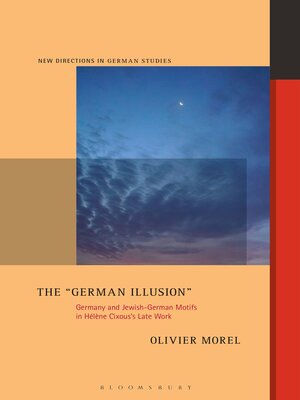The "German Illusion"
ebook ∣ Germany and Jewish-German Motifs in Hélène Cixous's Late Work · New Directions in German Studies
By Olivier Morel

Sign up to save your library
With an OverDrive account, you can save your favorite libraries for at-a-glance information about availability. Find out more about OverDrive accounts.
Find this title in Libby, the library reading app by OverDrive.



Search for a digital library with this title
Title found at these libraries:
| Library Name | Distance |
|---|---|
| Loading... |
Examines Jewish-German "tropes" in Hélène Cixous's oeuvre and life and their impact on her work as a feminist, poet, and playwright.
Hélène Cixous is a poet, philosopher, and activist known worldwide for her manifesto on Écriture feminine (feminine writing) and for her influential literary texts, plays, and essays. While the themes were rarely present in her earlier writings, Germany and Jewish-German family figures and topics have significantly informed most of Cixous's late works. Born in Algeria in June 1937, she grew up with a mother who had escaped Germany after the rise of Nazism and a grandmother who fled the racial laws of the Third Reich in 1938. In her writing, Cixous refines the primitive scene of a "German" upbringing in French-occupied colonial, antisemitic Algeria.
Scholar and filmmaker Olivier Morel delves into the signs and influences that "Germany," "German," and "Osnabrück" have exerted over Cixous's work. Featuring an exclusive interview with Hélène Cixous and stills from their travel together to Osnabrück in Morel's 2018 documentary, Ever, Rêve, Hélène Cixous, Morel's The "German Illusion" examines the unique literary meditation on the Holocaust sustained throughout her later texts.
Morel helps us to understand an uncannily original oeuvre that embodies the complexities of modernity's genocidal history in a new way.
Hélène Cixous is a poet, philosopher, and activist known worldwide for her manifesto on Écriture feminine (feminine writing) and for her influential literary texts, plays, and essays. While the themes were rarely present in her earlier writings, Germany and Jewish-German family figures and topics have significantly informed most of Cixous's late works. Born in Algeria in June 1937, she grew up with a mother who had escaped Germany after the rise of Nazism and a grandmother who fled the racial laws of the Third Reich in 1938. In her writing, Cixous refines the primitive scene of a "German" upbringing in French-occupied colonial, antisemitic Algeria.
Scholar and filmmaker Olivier Morel delves into the signs and influences that "Germany," "German," and "Osnabrück" have exerted over Cixous's work. Featuring an exclusive interview with Hélène Cixous and stills from their travel together to Osnabrück in Morel's 2018 documentary, Ever, Rêve, Hélène Cixous, Morel's The "German Illusion" examines the unique literary meditation on the Holocaust sustained throughout her later texts.
Morel helps us to understand an uncannily original oeuvre that embodies the complexities of modernity's genocidal history in a new way.







